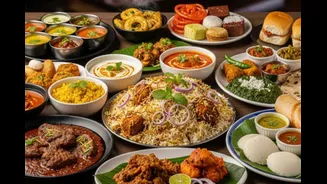Discover the art of building a healthy relationship with food. Dive into 7 tips for a happier you
Namaste, friends! How's your chai brewing? Today, we're not talking about garam masala or the perfect dudh
ratio. Instead, let's chat about something even more fundamental to our well-being: our relationship with food.

In our busy lives, often filled with deadlines and traffic jams, it's easy to let this relationship become strained. We might grab whatever’s fastest, ignore our hunger cues, or feel guilty after indulging in a sweet treat.
But hey, food is meant to nourish us, both physically and emotionally and this relationship should be one of love and respect! It's time to reclaim that joy and build a healthy connection with our plates.
So, grab your cuppa, get comfy, and let's dive into seven essential tips for a happier, healthier you, one bite at a time.
Ditch the "Diet" Drama:
Forget the fancy diets and the latest celebrity fads. They often set you up for failure and can lead to a cycle of restriction and guilt. Instead of focusing on what you can't eat, shift your focus to what you can eat. Think of nutrient-rich foods like fruits, vegetables, whole grains, and legumes.
Imagine your plate as a palette, a canvas where you can create a vibrant and colorful masterpiece. Start small by adding an extra serving of veggies to your meals or swapping refined grains for whole grains. It’s a gentle shift, not a drastic overhaul. Remember, sustainable change is key.
Diets are often temporary, but a healthy relationship with food is a lifelong journey. Small changes, done consistently, yield far better results than following unsustainable diets that are too strict. Think 'balance' and 'moderation' instead of 'all or nothing'.
It is important to be kind to yourself in this process. Treat yourself like you would treat a friend - with kindness and understanding. If you slip up one day, don't beat yourself up about it. Just get back on track the next day.
Tune in to Your Tummy's Tales:
We’ve all been there – eating a massive plate because it’s lunch time, even if we're not actually hungry. Or maybe we eat quickly while watching tv, barely noticing what we are putting in our stomachs . Learn to listen to your body's natural hunger and fullness cues.
Before you reach for that snack, ask yourself, "Am I really hungry, or am I just bored or stressed?". If you are hungry, great! Choose something nourishing. If not, find another way to cope with your emotions, such as going for a walk, listening to music, or calling a friend.
Similarly, pay attention to your fullness cues while you are eating. Stop when you are satisfied, not stuffed. It takes about 20 minutes for your stomach to signal to your brain that you are full, so eat slowly and mindfully.
Eating mindfully is about paying attention to your food and the experience of eating. Savour each bite, notice the textures, flavors, and aroma. This will help you appreciate your food more and make healthier choices.
Food is Fuel, Not the Enemy:
Many a times, we start thinking of food as something to be anxious about. It becomes a battlefield of "good" and "bad" foods, with guilt lurking around every corner. This kind of thinking can be damaging to your mental and physical health.
Remember, food is fuel that gives you energy to live your life to the fullest. All foods can fit into a healthy eating plan, in moderation of course. Indulging in a samosa or gulab jamun sometimes is perfectly fine.
Denying yourself your favorite foods altogether can lead to cravings and binge eating later. Focus on balancing less nutritious foods with nutritious ones throughout the day. The idea here is to find flexibility with what you eat.
Instead of labeling foods as good or bad, simply consider how they make you feel. Do they give you energy and make you feel good, or do they lead to sluggishness and stomach upset? Finding this balance can help with the idea of not thinking food is the enemy.
Plan Your Plate, Avoid Panic:
Ever find yourself staring blankly into the fridge, with no idea what to eat? This is a recipe for unhealthy choices. Planning your meals and snacks ahead of time can help you stay on track and make better food choices. Take some time each week to plan out your meals and create a shopping list.
This will save you time and money and will ensure that you have healthy options on hand when hunger strikes. Batch cooking is your buddy. Cook a big batch of dal or vegetable curry on the weekend and you'll have healthy lunches ready to go for the week.
Keep healthy snacks at the disposal readily such as fruits, nuts, and yogurt. This will prevent you from reaching for unhealthy options when you are feeling hungry. With some planning, you can make sure that you’re always prepared to nourish your body with wholesome and delicious food.
Hydration is Key, Yaar:
Sometimes, when we think we're hungry, we're actually just thirsty. Many people mistake hunger for thirst. Make sure you're drinking enough water throughout the day. Carry a water bottle with you and sip on it regularly and don’t wait until you are feeling thirsty to drink.

Aim to drink at least 8 glasses of water per day. Herbal teas, coconut water, and even diluted nimbu pani are also great options. Proper hydration will help you feel more energized, improve your digestion, and prevent overeating.
So, before you reach for that biscuit, try drinking a glass of water first. You might be surprised at how often you just need a little hydration. This is a great habit to inculcate as it could make a great change in your daily life.
Seek Support, Share Stories:
Building a healthy relationship with food is a personal journey, but you don't have to do it alone. Talk to your friends, family, or a registered dietitian. Sharing your experiences and struggles can be incredibly helpful. Sometimes, just knowing that you're not alone can make a big difference.
A registered dietitian can provide personalized guidance and support to help you achieve your goals. Support groups can also be a great way to connect with others who are on a similar journey. Sharing your struggles and successes with others can provide motivation and encouragement.
Together, you can learn from each other and create a supportive community that helps you stay on track and achieve your goals. This journey can be difficult sometimes, but remember – you don't have to face it by yourself.
So, lean on your loved ones, seek professional help if needed, and share your story to help others.
Be Patient, Practice Perseverance:
This part is the most important bit. Remember, building a healthy relationship with food takes time and effort. There will be ups and downs, good days and bad days. Don't get discouraged if you slip up. Just get back on track the next day.
Be patient with yourself and celebrate your progress along the way. Focus on making small changes that you can sustain over the long term. Remember, it's better to make slow, steady progress than to try to do too much too soon. Celebrate small victories along the way.
Did you eat a healthy breakfast today? Give yourself a pat on the back! Did you resist the urge to overeat? Awesome. Acknowledge your progress and be proud of yourself for taking steps towards a healthier relationship with food.
AI Generated Content. Glance/InMobi shall have no liability for the content


















